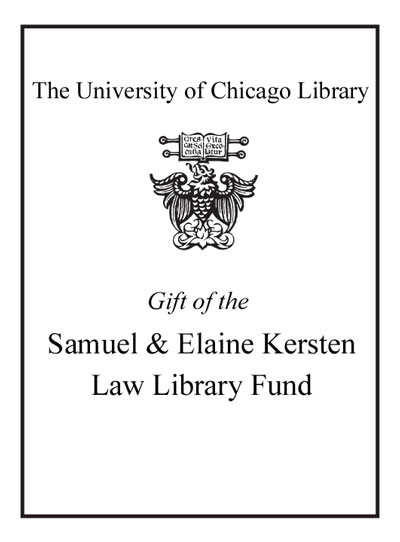Boundaries of discourse in the International Court of Justice : mapping arguments in Arab territorial disputes /
Saved in:
| Author / Creator: | Burgis, Michelle L. |
|---|---|
| Imprint: | Leiden ; Boston : Martinus Nijhoff Publishers, 2009. |
| Description: | xxvi, 307 p. ; 25 cm. |
| Language: | English |
| Subject: | |
| Format: | Print Book |
| URL for this record: | http://pi.lib.uchicago.edu/1001/cat/bib/7688142 |
Table of Contents:
- Preface: Journeys through Scholarly Quicksands and my Quest for Solid Ground
- Table of Cases
- Table of Treaties
- Acknowledgments
- Copyright Permissions and Acknowledgments
- Abbreviations
- Note on Arabic Transliteration
- Introduction
- 1. The Postcolonial Paradox
- 2. Scope of the Study
- 3. Central Research Questions
- 4. Why Arab?
- 5. Case Selection
- 6. Book Structure
- Part I. Theoretical and Historical Background
- Chapter 1. Listening for Silences in and beyond the Courtroom: Methodological Tools for Understanding ICJ Territorial Disputes
- 1. Introduction
- 2. Problematising Postcolonial Participation: Can We Now Speak of a 'World Court'?
- 3. NAIL and TWAIL on the Politics of Law and the Possibility of Universalism
- 4. Speaking in Tongues: International Law as Language
- 5. Interrogating Conventions within Mainstream ICJ Literatures
- 6. Conclusion: Law as Argument and Contestation about the Quest for Universalism
- Chapter 2. Between Faith and Place: Arab-Islamic Approaches to Authority over Territory in Theory and Practice
- 1. Introduction
- 2. How Should International Lawyers Study Islamic Law and its Contribution to International Law?
- 3. In the Wake of the Prophet's Message: Conquests, Caliphs and the Development of Islamic International Law
- 4. Caliphs, Capitulations and Colonialism in Ottoman Lands
- 5. From the Mandate Period to the Present: Independence, the Failure of Regionalism and the Place of Adjudication
- 6. Conclusion
- Part II. Contentious Cases
- Introduction to Part II: Constituting the Self through Territory: The Law and Practice of Territorial Disputes and Boundary Drawing
- Chapter 3. Sanctioning Colonial Legacies in the Sahara? The Construction of Postcolonial Selfhood in the Libya/Chad Territorial Dispute
- 1. Introduction
- 2. Corsairs, Camels and Caliphs: Historical and Geographical Background
- 3. The Need for Certainty and Simplicity: The ICJ on Treaty Interpretation and the Finality of Borders
- 4. Listening to the Court's Silences: The Pleadings of Libya and Chad
- 5. An Historical Afterthought: The Implications of the Colonial Legacy in a 'Postcolonial' World
- 6. Conclusion
- Chapter 4. (De)Limiting the Past for Future Gain: The Relationship between Statehood, Colonialism and Oil in the Qatar v Bahrain Territorial Dispute
- 1. Introduction
- 2. Background to the Dispute
- 3. The Jurisdictional Stage of the Case
- 4. The Court's Determination on the Merits
- 5. Competing Narratives on Statehood and Colonialism in the Gulf
- 6. Conclusion
- Part III. Advisory Opinions
- Introduction to Part III: Determining the Self through the ICJ's Advisory Jurisdiction: Procedures and Principles
- Chapter 5. Determining the Limits of Law in the Western Sahara Case
- 1. Introduction
- 2. Confusion over the Fate of Western Sahara and the Request for an Advisory Opinion
- 3. Playing with the Rules: Strategies of Argument before the Court
- 4. Constituting Selfhood before the Court: Legal Personality, Identity Politics and the Multicultural Limits of International Law
- 5. Conclusion
- 6. Postscript
- Chapter 6. Discourses of Division? Law, Politics and the ICJ Advisory Opinion on the Legal Consequences of the Construction of a Wall in the Occupied Palestinian Territory
- 1. Introduction
- 2. Background to the Opinion
- 3. The Decision of the Court
- 4. Contesting the Court's Jurisdiction
- 5. Strategies of Argument
- 6. The Promise of Doctrine?
- 7. Conclusion
- Conclusion
- Glossary
- Bibliography
- Primary Sources
- Secondary Sources
- Index

